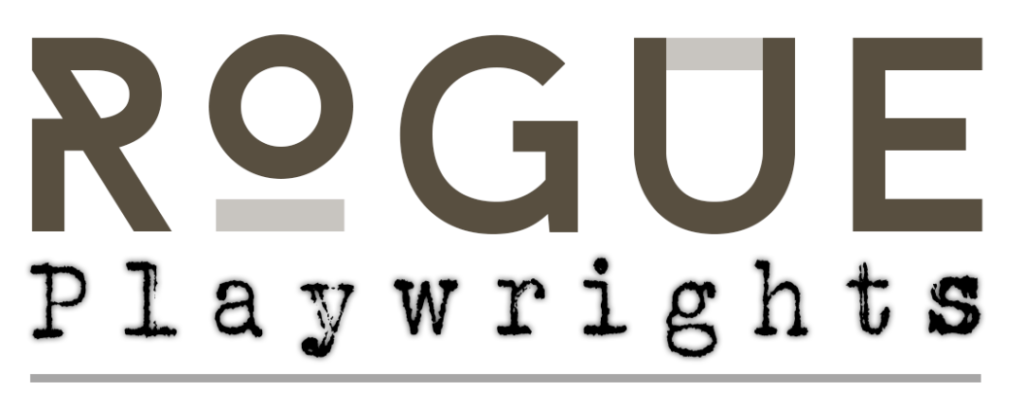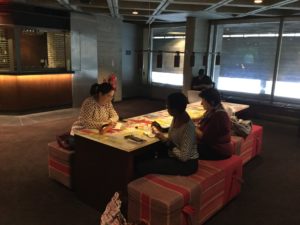Where do you go if you want to put on a scratch night? And who do even you talk to? In this guest post, playwright Joyce Lee discusses how her writers’ collective went about putting on a new writing night, including the triumphs and the tests!
Two years ago, a group of twelve playwrights embarked on the Developing Your Play Course at the National Theatre taught by Jemma Kennedy. Over ten weeks, we shared work and developed our craft further, soon finding that we got on really well together as a group.
So when the course ended, we decided to keep meeting once a month to continue our collaboration and skill-sharing on our own as a writers’ collective called The Rogue Playwrights. It’s been really rewarding to work together as writing can often be such a solitary task.
But all of us found that, though we’ve had some of our work performed as individuals, we’d experienced those moments when you wonder if anything you write will ever make it onto the stage. We often feel a bit powerless in the industry, wondering will that next play be plucked from obscurity?
So we decided to try and be self-starters, and aimed to self-produce an evening of our new writing together as a group. It would also be a chance to celebrate our collaboration with an audience.
Never afraid of a challenge, and armed with a desire to test out new ideas, we settled on the idea of writing short form plays in response to a provocation: the theme of Heaven or Hell.
But there’s a lot more to do once you’ve just had the initial idea. If you’ve ever thought of wanting to put on a new writing night yourself, or you’ve just been curious about how they happen, here’s what went next…
It takes time and working together
Sadly new writing nights don’t happen like magic – we came up with the idea almost a year before the event, so it has been long in the planning. We don’t have a formal leader of the group, it is very much a collective. This means we mostly take it in turns to forge ahead and, of course, take on different roles at different times.
We meet monthly and discuss how we plan to proceed with the various tasks assigned to each member of the group; these tasks have involved trying to sort out rehearsal space, actors, budgets, venue, and other logistics.
Even though we came up with the idea earlier in the year, it has taken us quite a while to get everything ready and organised!
Contact theatres
You’re going to need a venue, and the space will often dictate what style of pieces you can show (or at least influence it), so that’s the best place to start.
Having written to a couple of theatres to see how much their rates for renting the space for a night would be, we eventually got in contact with the White Bear Theatre’s Artistic Director, who very kindly offered us a box office split.
Apply for funding (and know what to say!)
We feel very lucky to have such a great venue for the night and a good deal that really helps with costs, but we want to try and pay everyone involved as well.
Sadly, as I’m sure it is with most playwrights, we couldn’t finance it ourselves, so we decided to put together an Arts Council application for a Grants for the Arts Award to support the project.
Some of us have put together ACE applications before, but it’s always difficult, and we’re still working on a contingency plan for if we don’t get the funding – but we’re keeping everything crossed!
We dived into writing the funding application and started with the initial idea of how we wanted to approach the night. We argued our case for how this project is giving us a chance to hone our skills and continue our professional development, as well as creating opportunities for other artists.
(Psst… if funding doesn’t work out (which annoyingly can happen!), you can read a piece here from playwright Tamara von Werthern about what to do what setbacks happen.)
Workshopping time
Most of the work for new writing nights actually happens before we even get to take the scripts to stage, with an important part being the development phase to the project.
For our particular new writing night, we have an upcoming workshop with our mentor from the NT, Jemma Kennedy, where we will explore the possibilities of writing short form plays; and we will also give each other feedback on each other’s plays.
Promote, promote, promote!
It’d be great if you could just stumble across an audience to sell-out your new writing night, but (as with most things in playwriting!) you’ve got to put the work in.
Invite friends, family, colleagues, but also use social media. And this doesn’t just mean tweet the odd link to tickets, it’s about targeting your audience. So if you’re new writing night was an LGBTQ+ night, you could tweet LGBTQ+ charities to help promote it, or get in touch with LGBTQ+ playwriting groups – it’s about knowing your audience.
Also link up with the theatre it’s going to be performed in – they probably already have a good way of promoting shows there, so it’s great to get ideas from them.
To the rehearsal room…
Following this, there will be the rehearsal process with professional actors and directors. A lot can change from getting to hear work read out loud or just having someone else with maybe a slightly different vision for a piece onboard – a piece is never really finished! But rehearsals mean you’re one step closer…
Curtains up!
Before you know it, it’s performance night itself! We’re looking forward to sharing our work with the general public and early-career theatre-makers, with the possibility of forging creative links for the future.
Putting on a new writing night is no-doubt a consuming and complex process, but it’s also an incredibly rewarding one. Sometimes it seems like you’ll never get it ready it time, but that’s when being in a collective with fellow writers feels like the best thing a playwright can do. And it certainly helps to have a passionate team working to make the night a success!
To get tickets for The Rogue Playwrights New Writing Night on November 13, click here.




Lovely blog, but where do new writing nights lead? They tend to be seen only by friends and relatives of the participants.
Hi Shea, it probably depends on the person, but I have found them invaluable for building links within the industry, meeting new collaborators, and also building my skills as a writer, because there’s no substitute for seeing your work onstage, even if it is with a friendly audience!